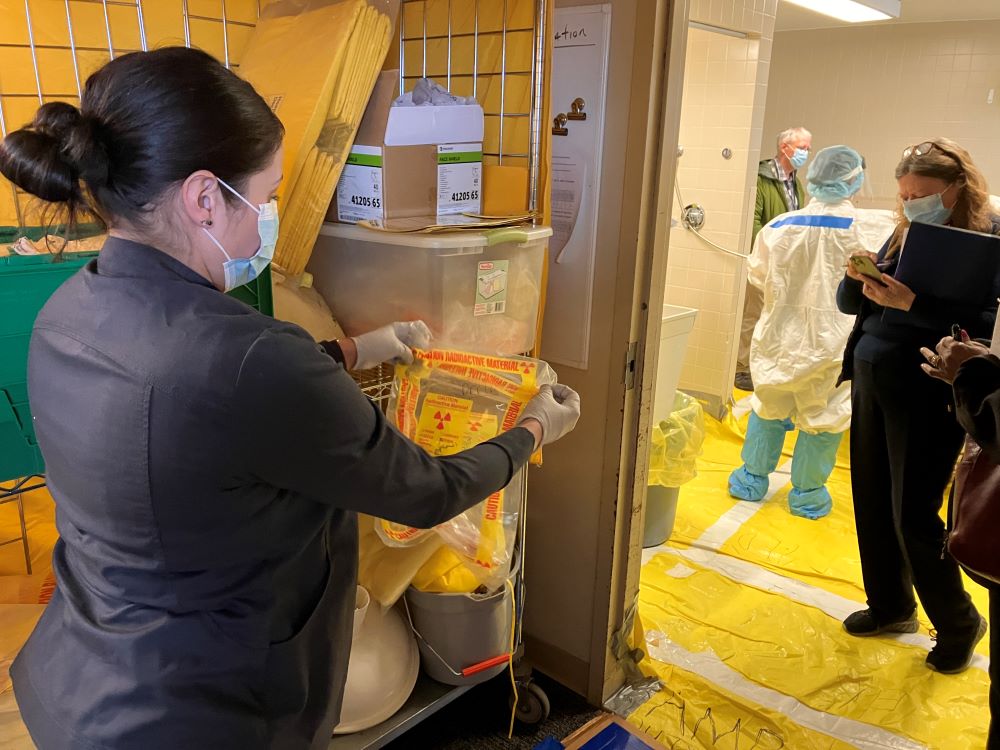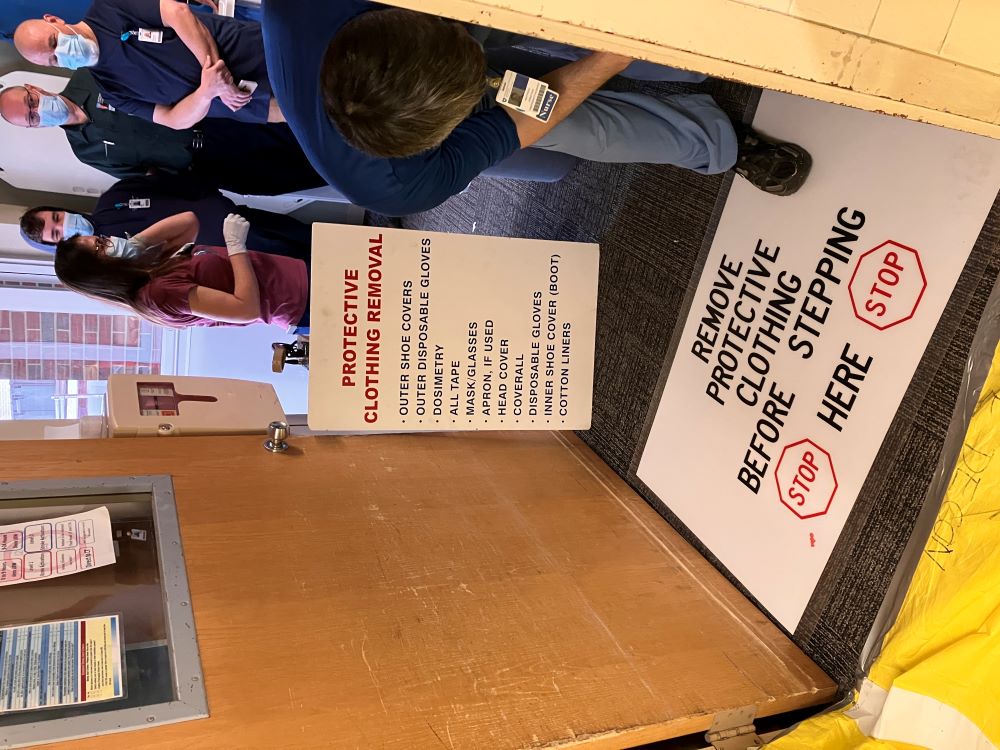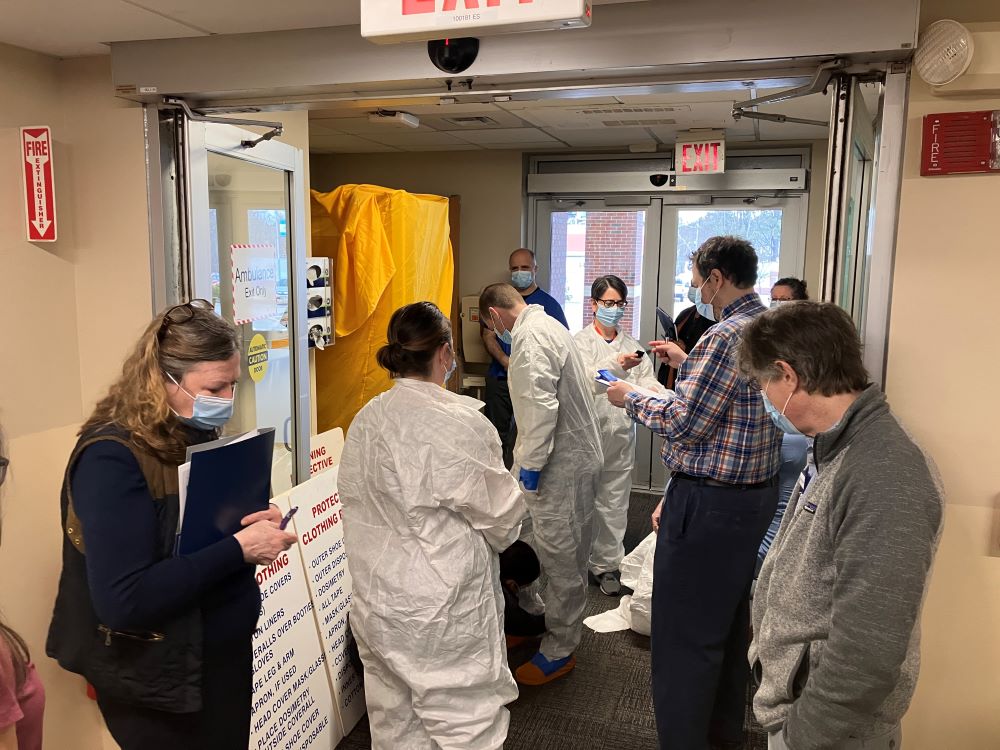For more information, contact Community Relations at:
09/27/2023
Wentworth-Douglass Hospital Highlights Efforts During National Preparedness Month
DOVER, NH – Wentworth-Douglass Hospital is celebrating National Preparedness Month, recognized in September, by highlighting its preparation efforts for unexpected events.
Emergency Preparedness is a top priority for Wentworth-Douglass, with comprehensive plans, detailed training, and refresher drills combing to keep the hospital ready to handle any situation. Scott Carpenter, Manager for Emergency Preparedness, has 17 years of experience in the field and joined Wentworth-Douglass a year ago. He is part of a new model at Mass General Brigham in which members of the system’s department of emergency preparedness and continuity are embedded onsite at MGB facilities.
“This is a great concept,” said Carpenter, “We are counterparts in the same fold, sharing knowledge and learning new perspectives. Last month, MGB convened a mass casualty workshop here at Wentworth-Douglass. Such programs advance skills for the entire team.”

Additionally, an ambitious Mass General Brigham initiative to update and rewrite emergency operation plans across the system was recently completed. “The new plans are a valuable enhancement to emergency operations,” said Carpenter. “Responses at all MGB facilities are now aligned. By establishing similar processes across the system, all team members can seamlessly step in and assist in a time of crisis. We are familiar with each other’s plans and can understand where to pick up and pitch in so that not a moment is lost in a crisis.” The coordinated support creates a deep bench of skilled professionals across the system.
Along with hospital and system leadership, Carpenter is promoting programs, drills and trainings designed to keep Wentworth-Douglass prepared at all times. He meets monthly to plan educational exercises and share information with the hospital’s interdisciplinary Emergency Preparedness Committee. With representation from executive leadership, clinical leadership, security and others, the committee has grown to more than 25 members, who pass on important updates and raise awareness. Throughout the hospital, those who are “first in line” for incident response receive in-depth trainings and attend regular refresher classes. These individuals pass their knowledge and skills “down the line,” as appropriate.
Clinical leadership is central to Wentworth-Douglass emergency planning. Additionally, there are several key departments in a response, including Emergency Department, Trauma, Plant Operations and Environmental Services. “Everyone has a role to play, though it may be to a varying extent,” said Carpenter. “In a high-impact incident, many more colleagues would be involved to keep care running smoothly and continuously. For instance, if the ED needs to be decompressed, clinical leadership may initiate discussions with the floors and take action if necessary.”

Carpenter enjoys working closely with colleagues at Wentworth-Douglass and across the MGB system, as well as with external professionals from municipal to federal levels. “Relationships are the best part of this job,” he said. “It’s a privilege—and also a lot of fun—to get to know people at Wentworth-Douglass and beyond. Should a crisis hit, I know who has which strengths and skills to bring to any given situation.”
Carpenter works collaboratively with local public safety officials, such as fire department chiefs, as well as with national regulators, such as The Joint Commission surveyors. He helps train our staff for a multitude of possibilities, including a plane crash or radiation incident (Code R). Wentworth-Douglass is designated as a receiving hospital for any incident at Seabrook Nuclear Power Plant and in April participated in a drill organized by the state of New Hampshire and the Federal Emergency Management Agency. The exercise involved external partners at Dover fire department, who transported a mock patient to the Wentworth-Douglass emergency department decontamination room. This month, there will be a regional mass casualty incident exercise with the Pease Development Authority involving local hospitals, which will include transporting mock patients to Portsmouth, Exeter, York, Rochester, and Dover.

Carpenter says drills and training are critical for honing skills, troubleshooting in advance of a crisis, and preparing teams to work together seamlessly. “Real world situations, such as hazardous materials decontamination, also keep our teams and Command Center proficient at working together in an emergency,” he said. “Well-defined roles and processes allow the clinical folks to focus on doing their job, without the distraction of resource procurement or other concerns. If we are able take something off clinical’s plate during an emergency, then that allows them to focus on what they do best.”

“We pride ourselves on being as prepared as possible to handle any situation on behalf of our patients, staff, and the community.”